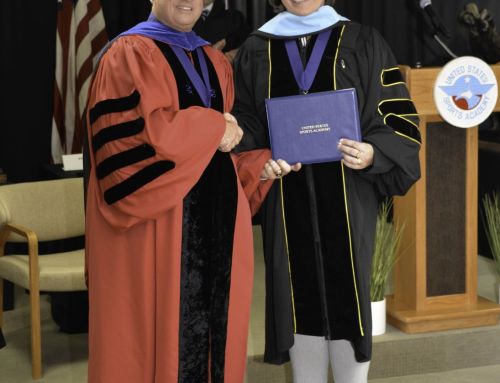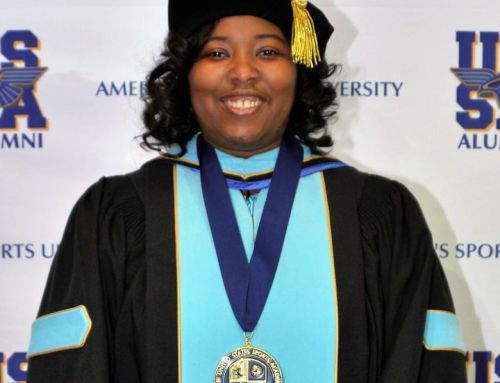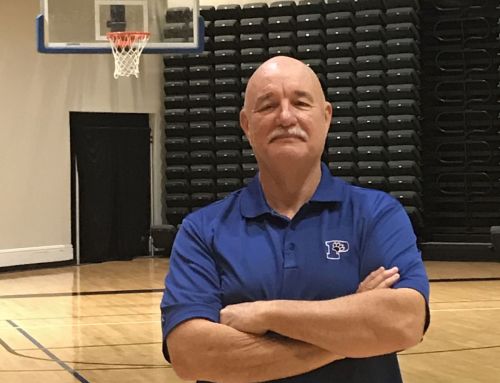Rick Fenoglio has been described as a “leading American soccer scientist” with more than 30 years of experience coaching and teaching different aspects of the game abroad in the United Kingdom. He’s worked at the highest levels of soccer there, including spending time with both the Manchester United and Manchester City professional clubs.
A native of Bristol, Tenn., Fenoglio earned a Master of Sports Science degree from the United States Sports Academy in 1989. The longtime soccer professional recently retired from working as a senior lecturer in football (soccer) at Manchester Metropolitan University to focus his efforts on contributing to the development of the sport in the United States. Fenoglio plans to launch a youth soccer academy in his home state of Tennessee.
In addition to work at Manchester Metropolitan University, Fenoglio has also served as an education professional for the Manchester City Football Club, contract specialist for Manchester United Football Club, and elite facility manager for Sport England across his 30-year career. He credited his Academy education as being a driver behind his success.
“The Academy played an integral part in my enjoyable career,” Fenoglio said. “The Academy was quite new when I enrolled in 1983 and sport and exercise science was really in its infancy. I was excited to be accepted as I felt I had found an academic discipline that I was truly interested in. That made all the difference in the world. I wanted to study hard and learn ‘all of it’. The Academy gave me that chance, and I took it with both hands.
“Through the program, I took part in a corporate fitness placement program in Boston and ended up being hired by the company at the end. After moving to England a few years later, my soccer science career took off, and I ended up being a consultant to Manchester United Football Club, assisting them with numerous youth projects over a 15-year period. I had found my dream job.”
Among his many professional accomplishments, Fenoglio is particularly proud of his work helping to spark a sports ethics movement in the United Kingdom. Fenoglio co-founded the “Give Us Back Our Game” campaign there.
“The campaign had a significant and beneficial impact on youth sports participation in many countries and sports – not just football (soccer),” he said. “Through the campaign, myself and the other co-founder and friend, coach Paul Cooper, successfully lobbied the Football Association to initiate change to the soccer playing formats for young players. More than that, our work again turned the attention of society to the problems that can arise in youth sport due to overzealous or poor coaching, pushy parents and win-at-all costs attitudes.
“US Soccer has recently followed the UK and adopted the same format changes to make the game more age-specific and more fun for kids. Hundreds of thousands of children have directly or indirectly benefited from the changes. I am very proud that our tenacious advocacy at the time was ultimately successful. So, you know, you really can change things if you set your heart and mind to it.”
A former multi-sport athlete in high school, Fenoglio was a member of the University of Tennessee’s men’s soccer team that won two Southeastern Conference championships in the 1980s. He was the MVP of the 1982 men’s SEC soccer tournament. Since that time, he’s seen soccer grow rapidly in the United States. But he would like to see more growth for the sport he loves.
“The game is very different from traditional American sports – it is much more fluid and free-flowing,” Fenoglio said. “I was able to make my own decisions while playing, rather than having to follow a set ‘play’. The game also suited my anthropometric body type. The game also has a strong international aspect to it, which also attracted me.
“Once I got hooked, that was it. So, I played the game as long as I could at as high a level as I could (semi-professionally), then devoted my sport science career and support work to advancing the game wherever I could, at whatever level I could (governance, professional or grassroots).
“Nashville now has a Major League Soccer team, and the game is more popular than ever. The U.S. women’s team has achieved great success and it would be great to see a U.S. men’s team get past the quarterfinal stage at the World Cup. The game has certainly come a long way since my UT playing days.”





